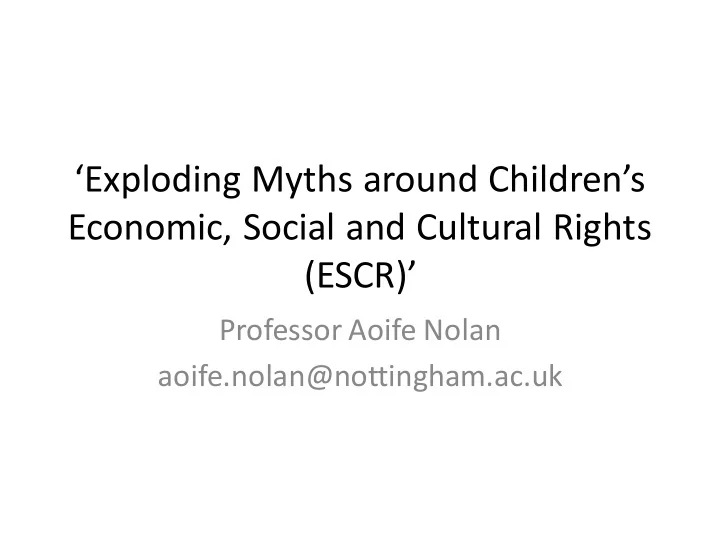

‘Exploding Myths around Children’s Economic, Social and Cultural Rights (ESCR)’ Professor Aoife Nolan aoife.nolan@nottingham.ac.uk
What Are We Talking About? Children’s ESCR under the CRC – State duty to ensure to the maximum extent possible the survival and development of the child (Art. 6) – Right of disabled children to special care (Art. 23) – Right to the enjoyment of the highest attainable standard of health (Art. 24) – Right to benefit from social security (Art. 26) – Right to a standard of living adequate for the child's physical, mental, spiritual, moral and social development (Art. 27) – Right to education (Arts 28, 29) – Right to the enjoyment of the child’s own culture (Art. 30) – Right to rest, leisure, play and to participate in cultural life and the arts (Art. 31)
What Duties Do Children’s ESCR Impose? Key obligation: • Article 4: States Parties shall undertake all appropriate legislative, administrative, and other measures for the implementation of the rights recognized in the present Convention. With regard to economic, social and cultural rights, States Parties shall undertake such measures to the maximum extent of their available resources and, where needed, within the framework of international co-operation. Primary duty of progressive realisation - within maximum available resources
Key ESCR Obligations under CRC As Set Out by the Committee • States must ‘progressively realise’ ESCR – states must show that they are moving as ‘ expeditiously and effectively’ as possible to full realisation of ESCR (Art. 4) • States must use the ‘maximum’ of the resources available to them – this means real resources, not just current allocations (Art. 4) • States must ensure children enjoy minimum essential level of ESCR (‘minimum core obligations’) (Art. 4) • Prohibition on deliberate retrogressive measures (i.e., backwards steps ) except in very limited circumstances (Art. 4) • States must shall ‘respect’ and ‘ensure’ children’s ESCR without discrimination of any kind (Art. 2) • The most vulnerable children must be prioritised in state efforts to realise ESCR (Art. 2) • States must respect , protect and fulfil ESCR (multiple General Comments)
Key Myths About Children’s ESCR – A Comparison With the Rights We Have Under UK Law • ESCR impose exclusively positive obligations, while civil and political rights (CPR) only give rise only to positive ones – Compare obligations imposed by right to a fair trial (Art. 6 ECHR) vs prohibition on forced evictions in terms of right to an adequate standard of living (Art. 27 CRC)… • ESCR are resource dependent and impracticable where resources are limited, while CPR are costless and immediately realisable – Since when have CPR been costless (e.g., child protection system required to give effect to Arts 2 and 3 ECHR) ? • ‘Vague’ ESCR are inherently so indeterminate as to be incapable of judicial enforcement (unlike ‘precise’ CPR) – Compare right to highest attainable standard to health (Art. 24 CRC) vs vague right to respect for private life and family life (Art. 8 ECHR)
Key Myths About Children’s ESCR • ESCR will lead to the displacement of the family – State has key supplementary and supportive role in terms of the CRC (Art. 18 and 27) • ESCR will place an impossible burden on the Treasury – Fundamental misunderstanding of ‘maximum available resources’ – State not required to do more than it can! • If we have legally enforceable ESCR, this will result in a violation of the separation of powers doctrine as it involves the courts exercising functions of the other branches of government – But court decisions in non-ESCR areas also often have implications for budgetary allocations or policy-making • Legally enforceable ESCR are ‘undemocratic’ – What about other rights? – And what about the fact that children don’t have a say in democracy? • Floodgates argument…
Key Things to Keep An Eye On In Terms of Addressing Myths • Committee General Comment on Public Spending on Children’s Rights ( forthcoming 2015) • New Optional Protocol (OP3) establishing a complaints mechanism to the CRC – But are ESCR a barrier to UK signing up? • OHCHR, ‘Towards a Better Investment in the Rights of the Child’ (March 2015) All will provide: (i) clarification of obligations imposed by ESCR and (ii) detail on how ESCR standards should apply in relation to policy and law-making development and implementation in practice.
Recommend
More recommend